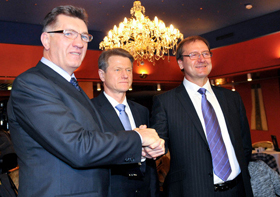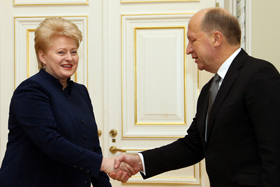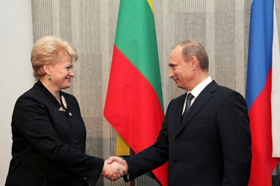The political pendulum in Lithuania has swung to the left. The right-wing conservative coalition was outvoted in the Seimas elections. A left-wing government is likely to be formed involving the Social Democrats as the senior partner alongside the Labor Party, founded by businessman Viktoras Uspaskichas, and Order and Justice, the party of ex-President Rolandas Paksas. But any speculation about the coming changes in Lithuania’s international policy are grossly premature. The confrontational inertia in relations with Russia built up by the outgoing conservatives remains. This is also something promoted by President Dalia Grybauskaité, who is acquiring greater political weight in view of the fragmented nature of party politics.
The Pendulum Swings to the Left
Two rounds of parliamentary elections took place in Lithuania over October 14 to 28. Lithuania’s Seimas is formed by parallel voting based on a mixed majoritarian-proportional electoral system. Second-round elections are held in majority constituencies where no candidates are elected during the first vote. The right-wing coalition of liberal parties that has been in power for the last four years suffered a defeat, although not such a drastic one as the most recent pre-election opinion polls predicted. The conservative right-wing nationalistic Homeland Union, the leading force in the coalition, received about 15% of votes via party lists. However, in single-seat constituencies it faired much better, which allowed it to come second and secure about a quarter of seats in the Seimas (See Table 1).
Two other leaders are the Labor Party, headed by the charismatic businessman of Russian origin Viktoras Uspaskichas, and the Social Democrats, veterans of Lithuanian politics that grew out of the Lithuanian Communist Party. While Labor was in the lead on the party ticket, after the second round vote count, the Social Democrats pulled away.
Table 1. Lithuanian Seimas Election Results, October 2012*
| Party |
Party lists (%) |
Number of Seats |
Majority Constituencies |
Total |
| Social Democrats |
18 |
15 |
23 |
38 |
| Homeland Union – Lithuanian conservatives |
15 |
13 |
20 |
33 |
| Labor Party |
20 |
17 |
13 |
30 |
| Order and Justice |
7 |
6 |
5 |
11 |
| Liberal Movement |
9 |
7 |
3 |
10 |
| Electoral Action of Poles in Lithuania |
6 |
5 |
3 |
8 |
| The Way of Courage |
8 |
7 |
0 |
7 |
| Other parties, independents |
|
|
4 |
4 |
| Invalid/blank votes |
|
|
1 |
1 |
| Total |
|
|
|
141 |
* The Table was compiled by the author based on data provided by the Central Election Commission of the Lithuanian Republic
The election results were hardly surprising. As soon as the parliamentary system was established in Lithuania a kind of a pendulum pattern formed, with the right-wing (Homeland Union) and the left-wing (the Social Democrats, previously the Democratic Labor Party) core parties alternating in office. Since the beginning of the 2000s, this bipolarity in the political status quo has experienced some changes. The key parties’ influence started to wane, forcing them to look for partners among other political groups: liberals, laborites, and the followers of ex-president Paksas. The popularity of the latter two has soared due to the increase in protest sentiment among the general public and the dwindling distinction in platforms and policies of the long-established parties. Thus, Rolandas Paksas secured almost two thirds of the vote during presidential elections in 2003, while the Labor Party received nearly 30% of the vote in the parliamentary elections of the same year, and formed the largest grouping in the Seimas.
The conservative part of Lithuania’s political elite felt threatened by this rise of political newcomers. The main media outlets and law enforcement agencies were mobilized in an attempt to cripple the newcomers. In 2004, President Paksas was impeached, the main reason being the pro-Russian policy of the popular Labor Party head Uspaskichas. First came accusations that he lobbied for his business interests, and eventually that he funded his party illegally. In 2005 he was dismissed from the post of Minister of Economic Affairs and even went into hiding in Russia. The mainstream media denounced both politicians as agents of Russian influence and populists. It seemed that they should give up all hope of a future in politics as lost.
However, this proved premature. Both Paksas and Uspaskichas became members of the European Parliament, thus not only providing themselves with an opportunity to keep the floor in politics, but also securing parliamentary immunity. Moreover, the ex-President was exonerated via the European Court of Human Rights. During the country’s most recent elections, their parties succeeded in winning over protest votes, primarily among the inhabitants of Lithuanian backwater areas whose only encounters with the country’s much-vaunted economic achievements come through the newspapers.
Conservative Legacy
It should be noted that the conservatives’ rule coincided with a serious economic downturn in Lithuania. In 2009, when the recession was at its worst, the economy plunged nearly 15% and even today, with economic activity officially on the rise, recorded unemployment totals approximately 10%. The government initiated stringent austerity measures: cutting wages and social benefits. But prices continued to rise, first and foremost, fuel and municipal services charges. The latest census registered a catastrophic population decline: over the last decade Lithuania has lost half a million citizens, primarily due to emigration. By autumn 2012, government statistics indicate, the population fell below the critical level of 3 million people.
While the conservatives were in office, relations with Russia continued to deteriorate. Lithuania persistently criticized Russia within the European Union and NATO, pursuing a policy of energy independence and security, which meant, in effect, independence from Russia. At the same time, Russian projects related to energy generation were furiously criticized, namely, the construction of the Baltic Nuclear Power Plant in the Kaliningrad Region. In the meantime, the Lithuanian government was pushing for the construction of the country’s own nuclear power plant in Visaginas, even though an opinion poll dated October 14, 2012 showed that two thirds of the population were opposed to this idea. Obviously Lithuania has recently developed a heightened interest in maintaining a certain degree of confrontation with Russia, since these projects are of political, rather than economic, significance.
Confrontational Inertia
In view of the affinity between platforms and pre-election agreement, the formation of a left-of-center coalition was expected. It was anticipated that it would comprise the Social Democrats, the Labor Party and Order and Justice. However, President Grybauskaité introduced some suspense into these developments, having declared that the Laborites’ participation in government would be unacceptable. This position was bolstered by the law enforcement agencies: just on the brink of the second round of elections they brought charges against the party leaders accusing them of fraudulent party funding. Even if the president backtracks, or her opinion is totally ignored and a left-wing government is indeed formed, any potential thaw in relations with Russia would be stifled by a number of factors.
First, the adverse trend formed over the years during which the conservative-liberal coalition was in office will still have an impact on bilateral relations. In addition to the abovementioned hostilities, an investigation into Gazprom’s activity was initiated at European Commission level. A law-suit was filed with the Stockholm International Arbitration Court against the Russian gas supplier for the recovery of over $ 1 billion which, the Lithuanian party claims, was acquired through the abuse of the company’s dominant position and price rigging. Besides, Lithuania stepped up the implementation of the EU Third Energy Package, providing for the demerger of Lietuvos Dujos (Lithuanian Gas) whose major stock-holder is Gazprom. It is highly probable that, eventually, this plan will entail the nationalization of Lithuania’s gas transmission network. Attempts to collect compensation from Russia for damage suffered during the period of “Soviet occupation” were also revived. Results of the nationwide referendum of 1992 and the provisions of the corresponding legislative act of 2000 serve as the legal basis for this claim. A special-purpose commission was formed in 2012 to determine the extent of the damages (an amount exceeding 20 billion euros has been referred to) although such efforts had also been made previously.
Operational inertia is also inherent in the foreign services and other authorities staffed under the conservative government that aim to secure the maximum possible independence from the former “mother country” and there is a noticeable marginalization of opposing groups that advocate a positive approach in relations with Moscow.
Second, the political elite and expert community within Lithuania have moulded an iron-cast image of Russia, complete with rigid stereotypes and associated myths. Based on the interpretation of Lithuanian-Russian relations in the 90s, it is assumed that positive, pragmatic tactics (as a rule employed by left-wing coalitions) proved less effective than strident anti-Moscow rhetoric designed to unify public opinion and internationalize unresolved issues in bilateral relations. The need to internationalize relations with Russia (through EU and NATO structures in particular) is frequently justified by the asymmetry of the Russian-Lithuanian dialogue. There is a strong feeling in Lithuania (unfortunately not without reason) that Russia does not treat the Republic as an equal partner, or respond to its appeals for collaborative action. According to the results of a public opinion poll, equality and mutual respect come second (trailing only energy security) as the most significant factor in Russian-Lithuanian relations: this box was ticked by 46% of the respondents.
In terms of politics, over the last two decades, Russia has been assigned the role of “significant other.” The modern Lithuanian identity is currently being formed as an antithesis – in opposition to Russia, which is perceived as a dangerous, unpredictable and potentially unbalanced partner. There is also the added stereotype of Russia as an authoritarian, essentially non-European, state seeking to use the energy supplier trump card for political leverage. This argument, that a new generation free from the burden of past experience would emerge, seems disputable at the very least, since today numerous attempts are made to review Russia’s negative image as a prerequisite in Lithuania’s broader perception of its own security and position within European politics. There is, however, a lingering public demand for the return to normality in Lithuanian-Russian relations. According to a recent poll, the share of Lithuanians who regard Russia with goodwill is slightly higher than the share of those who criticize it (53% versus 42%). Although the image of Russia in Lithuania is rooted in history, it is chiefly the result of much more recent, conscious efforts on the part of Lithuania’s political elite.
In terms of economics Russia remains Lithuania’s key commercial partner. The fuel and energy sector, that is gas, oil and electric power, command a significant share in the two countries’ commodity trade. Following the shutdown of the Ignalina Nuclear Power Plant in 2009, electric power supply from Russia satisfies over half of Lithuania’s electricity consumption. Leading Russian companies, including Gazprom, Lukoil, RAO UES, are among the major investors. But a prevalent concern within the Lithuanian political establishment, and particularly its conservative wing, is that Russia’s presence in strategic sectors of the economy poses a definite threat. The belief is that Russia is not just in it to turn a profit, rather, it wields its economic influence in order to influence internal political affair.
Third, under the Constitution, it is the president who determines the country’s foreign policy. Early on in her term of office, President Grybauskaité advocated improved relations with Russia, however nothing was done to see this come about. The president is one of those who advocates energy independence and during parliamentary elections gave firm support to the ruling conservative coalition. Equally important is the fact that Grybauskaité is the country’s most popular politician. Given the fragmented nature of party politics in Lithuania, the role of President is surely set to increase. Not surprisingly, Butkevičius, Social Democrat leader and most likely candidate for the post of Prime Minister in the new government, has already declared his adherence to the current foreign policy. He has also named a possible candidate for the position of head of the Foreign Affairs Ministry: Linkevičius, current Lithuanian Ambassador to Belarus and Lithuania’s former Permanent Representative to NATO. The Social Democrats are equally highly cautious in their criticism of energy-related projects originated by the conservatives.
Thus one can hardly expect any drastic changes in Lithuanian foreign policy, including in its relations with Russia, following the parliamentary elections. However, it is reasonable to assume that the Social-Democratic coalition would at least not aggravate the bilateral agenda, and would pursue a more pragmatic policy devoid of confrontational rhetoric in its dealings with Russia. This would present an opportunity for the revival of a mutual dialog further augmented by the two countries’ continuing interdependence (in the economy and energy related sectors, as well as on the Kaliningrad issue). In return, Moscow is expected to treat its Lithuanian partner with consideration and respect.








